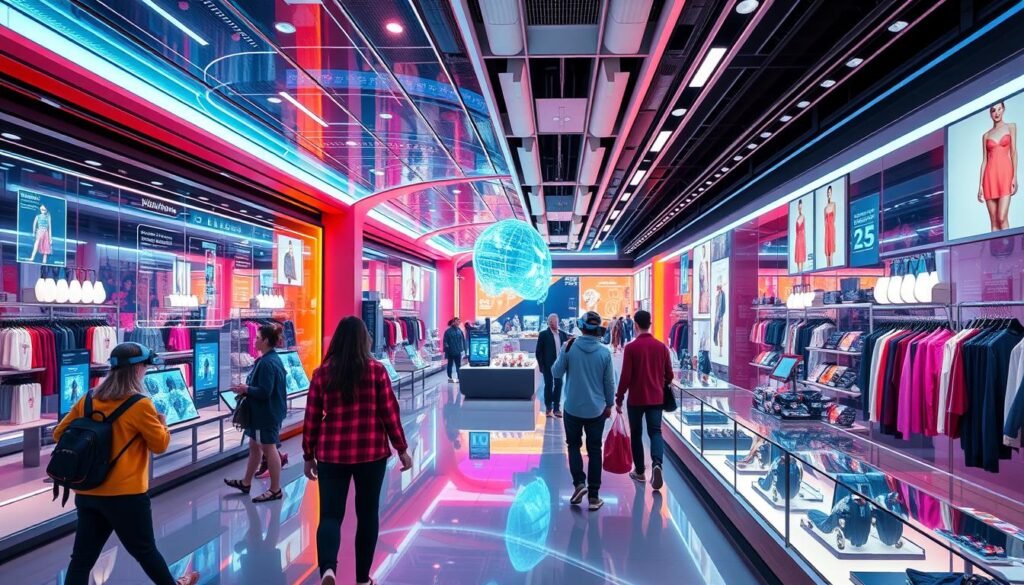In today’s fast-paced retail world, AI is changing how we shop online. As someone who works in e-commerce, I see how AI can make shopping more personal. It uses machine learning to understand what each customer likes and needs.
AI helps by suggesting products that match what you’re looking for. It uses data from your browsing and buying history. This makes shopping more fun and relevant.
Exploring AI personalization is exciting. It brings new ways to shop online. From chatbots to virtual mirrors, AI makes shopping better and more fun.
Key Takeaways
- AI-powered solutions can increase sales by offering highly relevant personalized product recommendations.
- Advanced AI applications can utilize real-time data to provide personalized discounts and offers.
- Machine learning algorithms can predict trends to prioritize product recommendations.
- AI-driven chatbots and virtual assistants enhance the customer service experience.
- AI technologies like AR and virtual mirrors improve the in-store shopping experience.
Understanding AI-Powered Shopping Personalization
The rise of data-driven personalized shopping is changing the e-commerce world. AI algorithms for retail personalization help businesses give shoppers experiences that fit their likes and needs.
The Role of Machine Learning in E-commerce
Machine learning is at the core of this change. AI systems look at lots of customer data, like who they are, what they’ve looked at, and what they’ve bought. This lets businesses offer personalized product search with ai. Shoppers get recommendations and deals that make them more likely to buy.
How AI Analyzes Customer Data
AI uses smart data analysis and predictive models to find out what customers like and want. It even guesses what they might buy next. This helps retailers tailor their products, prices, and ads for a better shopping experience.
Real-Time Personalization Benefits
- Improved conversion rates and increased revenue
- Lowered customer acquisition and marketing costs
- Enhanced customer loyalty and repeat business
- Streamlined checkout process with predictive autofill
AI’s power in personalizing shopping is clear from its success in e-commerce. For example, Amazon’s personalized recommendations are a big part of its income. This boosts sales and keeps customers coming back.
As more businesses use AI for personalization, e-commerce will get even better. It will be more tailored, efficient, and focused on the customer than ever.
The Current State of Online Shopping Experience
The online shopping world has changed a lot in recent years. This change is thanks to new tech like artificial intelligence (AI) and machine learning. Now, finding what you want online is easier, thanks to AI.
Studies show that 69% of shoppers want new items every time they shop. This need for unique shopping experiences has made retailers use AI. AI helps them offer better, more personal shopping experiences.
AI’s effect on shopping is clear. A German store, Engelhorn, saw its online sales go up by 2.5%. They also got a 1.5% increase in average order value and a 4% boost in revenue. Icebreaker, a clothing store, saw a 28% jump in sales from AI-recommended items and an 11% increase in average order value.
As online shopping keeps growing, AI and machine learning will be key. They help make shopping online more personal and easy. By using AI, stores can sell more and keep customers coming back.
“Among marketers using AI, 57% say that personalization technology is key to unlocking true 1-to-1 customer experiences.”

How to Use AI to Personalize Your Shopping Experience Online
Artificial intelligence (AI) can make your online shopping better. By setting up AI preferences, you can make your shopping fit your needs. This makes shopping more fun and helps you find products that are just right for you.
Setting Up AI-Powered Preferences
Begin by letting the online store know about your shopping history and likes. This lets the AI learn what you like and what you might like next. As you shop more, the AI gets better at finding products that match your style.
Leveraging Smart Product Recommendations
Getting smart product suggestions is a big plus of AI shopping. The AI looks at what you’ve bought and what you’ve looked at to suggest items you might like. You might find new things, items that go well together, or even special bundles just for you.
Optimizing Search Results
AI can also make your search results better. The AI looks at your shopping history and what you like to show you the best results. This means you can find what you need fast and easily.
“57% of marketers using AI say personalization technology is key to unlocking true 1-to-1 customer experiences across every touchpoint.”
AI has changed the retail world for the better. It offers custom suggestions, personal experiences, and better customer support. This leads to happier customers and more business growth.
Using AI for personalization makes shopping more enjoyable and efficient. It helps you find what you need and builds a stronger bond with the brands you love.
AI-Driven Product Recommendations and Search Optimization
In today’s fast-changing e-commerce world, using artificial intelligence (AI) is key. It helps create shopping experiences that match what each customer likes. This approach keeps customers happy, boosts sales, and increases the value of each order.
Big names like engelhorn and Icebreaker have seen huge benefits from AI. Icebreaker, for example, saw a 40% jump in clicks on product recommendations. They also made 28% more money from these suggestions.
AI’s strength is in analyzing data in real-time. This lets businesses show customers exactly what they want to see. AI learns from how customers act, making shopping more personal and keeping them coming back for more.
| Statistic | Value |
|---|---|
| Customers preferring personalized shopping experiences | 90% |
| Customers feeling overwhelmed by online shopping choices | 70% |
| Increase in customer engagement and loyalty with personalized recommendations | 30% |
| Increase in sales through personalized product suggestions | 25% |
| Online retail giants relying on AI-powered recommendation platforms | 70% |
By using AI for product suggestions and search, businesses can improve customer satisfaction. This also leads to more sales and loyal customers. As more people want personalized shopping, using AI will be vital for success online.

Enhancing Customer Experience Through AI Personalization
AI is changing how we shop online. It lets businesses give customers a unique and smooth experience. This keeps customers happy and coming back.
Mobile Shopping Integration
Most people (71%) use mobiles in stores. AI makes shopping on mobile better. It shows them what they want fast and helps them buy easily.
AI also helps store staff suggest more items. They do this based on what each customer likes and buys.
Customized Content Delivery
AI watches how customers act and what they like. This lets websites and apps show them content that fits their tastes. It makes shopping better and more fun.
Brands like Spotify and Sephora use AI to make customers happy. They see big gains in how much customers like them.
Personalized Pricing and Offers
AI can change prices and offers for each customer. It looks at many things like what others are charging. This makes shopping more personal and satisfying.
AI is making shopping even better. It’s getting smarter with voice commands, AR/VR, and better data. As businesses focus on personalizing, shopping will get even better.

Data Privacy and Trust in AI Shopping
As ai-driven customer insights for e-commerce and data-driven personalized shopping grow, data privacy and trust are key. Businesses need to balance using AI for great shopping experiences with keeping customer info safe.
A survey found 81% of people are okay with AI helping find products they might like. But, 82% worry about AI affecting their online privacy.
To gain trust, companies should let customers choose not to share their data. Using data masking and following laws like GDPR and CCPA helps keep user info safe.
As AI changes shopping online, keeping data safe and earning trust is crucial. By finding the right balance, businesses can use AI to improve shopping without losing customer trust.
The future of online shopping is combining AI with strong data protection. Companies that get this right will win customer loyalty and trust.
Visual Search and AI Style Assistance
In today’s digital world, shopping has changed a lot. Thanks to ai-enhanced shopping experience and personalized product search with ai, we now have new ways to shop online. Visual search and AI style assistance are leading this change.
Image Recognition Technology
Visual search uses advanced tech to find products you like. Just upload a picture or take a photo. Then, you can find similar items from a huge collection. This makes online shopping easier and more fun, especially for Gen Z.
Virtual Style Recommendations
AI style assistance is also changing how we shop. It acts like a virtual stylist, knowing what you like and suggest products. It uses smart algorithms to find items that fit your style, size, and budget.
Smart Product Discovery
Visual search and AI style assistance have changed how we find new products. Brands like H&M, Amazon, Myntra, and IKEA use these tools. They give customers a ai-enhanced shopping experience that’s easy and tailored to them. This makes finding the right items simple, even with so many choices.
The future of online shopping looks bright with these technologies. The market for them is expected to hit $10 billion by 2026. Retailers who use personalized product search with ai will lead the way in creating great shopping experiences.
AI Shopping Bots and Customer Support
AI shopping bots are changing the retail world. They help businesses talk to customers in new ways. These smart helpers take on simple tasks, letting humans focus on more complex issues.
Levi’s is leading the way with AI assistants. They help with fashion advice, product info, and more. These chatbots make online shopping easier and faster for everyone.
- Over 60% of users engaging with Amazon’s Rufus use its product recommendation features, leading to a 15% improvement in conversion rates.
- Customers who interact with Rufus on Amazon show a 20% higher retention rate than those who don’t use the chatbot.
- Ava, an AI chatbot from eDesk, deflects up to 70% of customer service tickets, especially for pre-purchase inquiries.
- One customer said Ava understood their product better than they did within twenty-four hours of implementation.
AI chatbots like Rufus and Ava make shopping better. They answer questions quickly, saving time and helping customers feel confident in their choices.
The ai-driven customer insights for e-commerce and ai-enhanced shopping experience are getting better. The AI shopping assistant market is growing fast, expected to reach $14.1 billion by 2030. These tools help businesses keep customers happy and work more efficiently.
| Key Benefits of AI Shopping Assistants | Challenges Faced by Businesses |
|---|---|
|
|
Businesses face challenges when using AI shopping assistants. But, by always improving and meeting customer needs, they can make the most of ai-driven customer insights for e-commerce. This leads to a better ai-enhanced shopping experience.
Implementing AI for Better Purchase Decisions
As e-commerce grows, smart retailers use AI algorithms for retail personalization to improve shopping. AI tools use customer data to change online shopping. This includes smart cart analysis, predicting shopping patterns, and learning customer preferences.
Smart Cart Analysis
AI changes how we shop by analyzing our carts in real-time. It finds deals, bundles, and recommends products to increase sales. Studies show personalization can boost conversion rates by up to 15%.
Predictive Shopping Patterns
AI predicts what we might buy based on our past and current trends. It uses data to forecast our future shopping. With 66% of customers wanting personalized experiences, this is key for success.
Automated Preferences Learning
AI learns our preferences by analyzing our interactions. This makes shopping more personal and increases loyalty. It leads to higher conversion rates and better customer loyalty.
As e-commerce evolves, AI will be crucial for retailers. It helps them stay competitive and offer unique shopping experiences.
| Statistic | Value |
|---|---|
| Percentage of consumers who prefer brands that recognize them and offer tailored recommendations | 91% |
| Increase in conversion rates from personalization strategies | Up to 15% |
| Percentage of consumers more likely to make a purchase when offered personalized experiences | 80% |
| Percentage of customers who expect companies to understand their unique needs and expectations | 66% |
| Increase in sales from personalization in retail | 6-10%, 2-3 times faster than other retailers |
The Future of AI in E-commerce Personalization
The future of AI in e-commerce looks bright. The AI-enabled eCommerce field is set to grow at 15.7% CAGR over eight years. It will reach $16.8 billion by 2030. As AI technology evolves, it will be key in making shopping more personal and efficient.
Future AI in e-commerce might include more detailed personalization. AI personal shoppers could guess what you want even better. Augmented reality (AR) could let you try products virtually before buying. Also, voice shopping with AI assistants and chatbots could change customer service.
AI in e-commerce is already growing fast, with 84% of businesses using it. It will boost sales, keep customers coming back, and make them happier. By using machine learning and data, e-commerce can offer unique shopping experiences. This will help businesses grow and succeed online.






